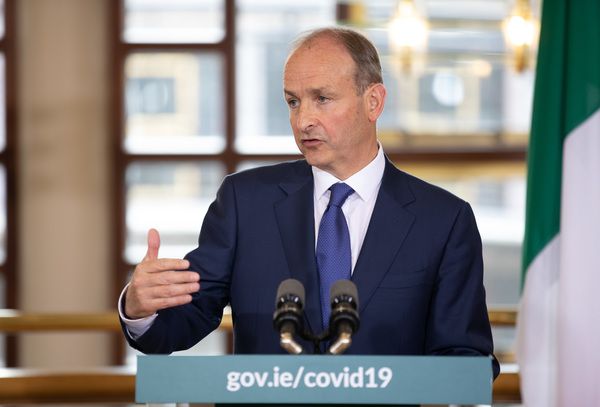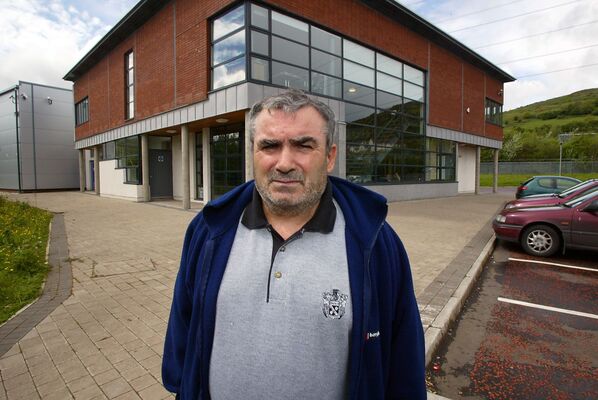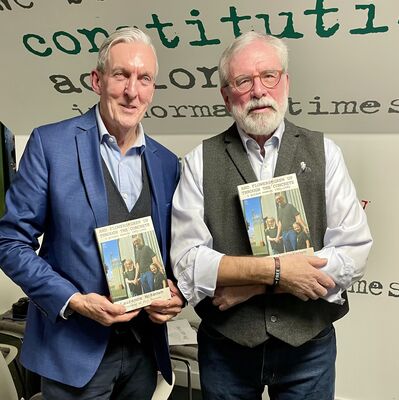MONDAY was St Brigid’s day, the Celtic day Imbolc - the first day of spring. It marks the turn of the seasons when the dark nights begin to turn and the weather starts to get warmer. It is the festival of fertility. It is the end of cold and darkness of winter and the beginning of a new season of light and hope.
St Brigid crosses, made from reeds and straw, can still be found in many homes. There is one on the front and back door of our house. Bronze or silver St Brigid crosses are popular mementoes often worn as necklaces or brooches. A poem written in 1735 has one of the earliest references to the cross and to its power.
St Bridget’s cross hung over door Which did the house from fire secure. O Gillo thought, O powerful charm To keep a house from taking harm; And tho’ the dogs and servants slept, By Bridgets care the house was kept.
St Brigid is a popular saint within the Irish Catholic tradition. She is a strong woman. The popular patron saint of babies, cattle farmers, blacksmiths, dairy workers, midwives, sailors, fugitives, poets, Leinster, travellers and many more. I say popular saint because the Catholic Church has never canonised her. Maybe because she is a strong woman?
Traditionally it is claimed that she was the head of an Abbey in Kildare. This column believes that Brigid is an example of the early Christian Church appropriating a pagan Celtic goddess – in this case Brigid/Brigantia, a fire goddess. This was frequently done, not just in Ireland, to make the job of conversion from the old religion to the new religion easier.
Brigid’s birthplace is thought by some to be at Faughart in County Louth where there is a shrine to her. One report mentions the ruins of an ancient church referenced as Teampull Brighde na hAirde (Temple of Brigid) in the Ordnance Survey Letters (1836). Many of the stones, wells and other places associated with Brigid are often linked to earlier megalithic tombs and raths.
There are many localised stories associated with Brigid all across the island. Many connected to the eve of St. Brigid’s Day.
Tonight is St Brigid's eve so don't forget to leave a cloth or scarf outside to be blessed by the saint as she passes. Known as a 'Bratog Bride' in Irish folklore, this special garment can then be used as a cure for headaches or sore throats #folklore #Ireland pic.twitter.com/5H2TPrL8UN
— Irish Archaeology (@irarchaeology) January 31, 2021
On Sunday Archaeology Ireland posted the Tweet above.
Saint Brigid’s Day marks the first day of spring and the end of winter. A sign of hope. So lets’ be hopeful. Anois ar theacht an tSamhraidh. The summer is coming.
WOLFE TONE: His vision remains relevant today
Tone’s cordial union is one worth striving for
ONE period in our history which holds lessons for today took place 200 years ago at the end of the 18th century. Ireland was subject to serious economic distress. There was widespread discrimination against Catholics and Presbyterians and dire poverty in rural Ireland. England’s domination of Ireland had retarded our economic development. The London government was pursuing policies aimed at protecting English economic interests. Does that sound familiar?
Our starting point should be Tone’s promotion of a new union – a cordial union – between the people of this island as a positive means of achieving this. A cordial union in which all of our citizens can live in equality and respect and which provides an opportunity to reshape the Ireland of today.
In seeking to face up to the crisis created by the English government Wolfe Tone concluded that “Ireland would never be either free, prosperous, or happy, until she was independent, and that independence was unattainable, whilst the connection with England existed.”
To tackle England’s economic stranglehold and to build a new society on the island of Ireland Tone argued for a new relationship between the people of Ireland. He wrote: “The weight of influence in the Government of this country is so great as to require a cordial union among all the people of Ireland, to maintain that balance which is essential to the preservation of our liberties and the extension of our commerce.”
As the debate around a unity referendum and united Ireland intensifies and the issues of self-governance and self determination become ever more relevant in the public discourse, we too need to chart a course forward that ensures that the people of Ireland are free, prosperous and happy.
Our starting point should be Tone’s promotion of a new union – a cordial union – between the people of this island as a positive means of achieving this. A cordial union in which all of our citizens can live in equality and respect and which provides an opportunity to reshape the Ireland of today; to end past divisions and resolve outstanding differences in the common good.
United Irelanders are re-imagining a better Ireland. We want to share that better Ireland with others. Together, through reconciliation and inclusivity we want to build a new partnership. A new cordial union. The imperative, for the peaceful transition to an agreed Ireland, will increasingly depend on mutual respect, ongoing social and economic stability and security for the whole island and all its people.
The peace process and the Good Friday Agreement have transformed the lives of every citizen on this island, especially in the North. But much needs to be done to end poverty and inequality and to reverse disadvantage and tackle sectarianism.
So how do we create a new Ireland which comprises all of our narratives, embraces all our cultures, respects all our languages, and excludes no-one? By dialogue. In the same way that dialogue was needed to end decades of conflict so dialogue is also needed to reshape society today. We cannot allow those who paint words of hate on gable walls to dictate our future. The onus is on the Irish government, the political parties, civic society North and South, to consciously address the genuine fears and concerns of those opposed to unity in a meaningful way.
In conversation and as good neighbours we have to explore with our unionist neighbours what they mean by their sense of Britishness. And work to agree how that sense of Britishness can find a place in a new Ireland. There will also be other voices North and South who will reject being categorised as either nationalist or unionist and whose views must also be given equal attention.
The debate on a unity referendum and a united Ireland has to be transparent and inclusive. Every voice must be listened to honestly and attentively and their concerns openly addressed. In this way we can put in place a process that will allow all of us explore how our island society can agree on common principles of democratic self-determination.
Finally, let me restate: the ending of partition and a united Ireland is not the property solely of Sinn Féin, nor indeed any one grouping or party. It must be the property of all. That means United Irelanders should not wait until the political parties or the Irish government engage with you. You can and should engage with your family, your friends, your workmates, your community, online and through social media.
Write letters. Support the efforts of whoever you feel most comfortable with to promote a united Ireland. Organise your own conferences or forums. You can publish your own proposals.
Ireland’s Future and other groups are doing this. Several prominent universities in Ireland, Britain and the USA have also published papers on unity. So there is lots going on – lots to do – and a role and place for everyone in doing it.
Micheál’s refrain is so familiar
AN Taoiseach Micheál Martin was at it again on Sunday, describing the possibility of a unity referendum as “divisive”. His words echoed those of Arlene Foster who just a week earlier described such a referendum as “reckless” and “incredibly divisive”.
Their agendas are different but in their opposition to Sinn Féin theses two leaders find common cause. To be clear, Sinn Féin has never advocated for an immediate unity referendum. We negotiated its inclusion in the Good Friday Agreement on the basis that it was a decision to be taken at an appropriate time and after due consideration by the people of Ireland. We are very mindful that the Brexit referendum was not properly planned for and the people of these islands have suffered the consequences of this.
It doesn’t take a genius to work out why Arlene Foster is opposed to a referendum. The unionist parties are for the union with Britain. They are what is says on the tin – unionists. They want to retain the link with Britain and they are against the unity referendum.
The rationale behind Micheál Martin’s opposition is different. The Fianna Fáil leader, like his counterpart in Fine Gael, and the Irish political establishment generally, want to retain the status quo. They want to retain political power. Sinn Féin is a threat to that. Irish Unity is a threat to that. The task for all of those of us who want change is to increase the public momentum towards the referendum. That is the only way forward.








